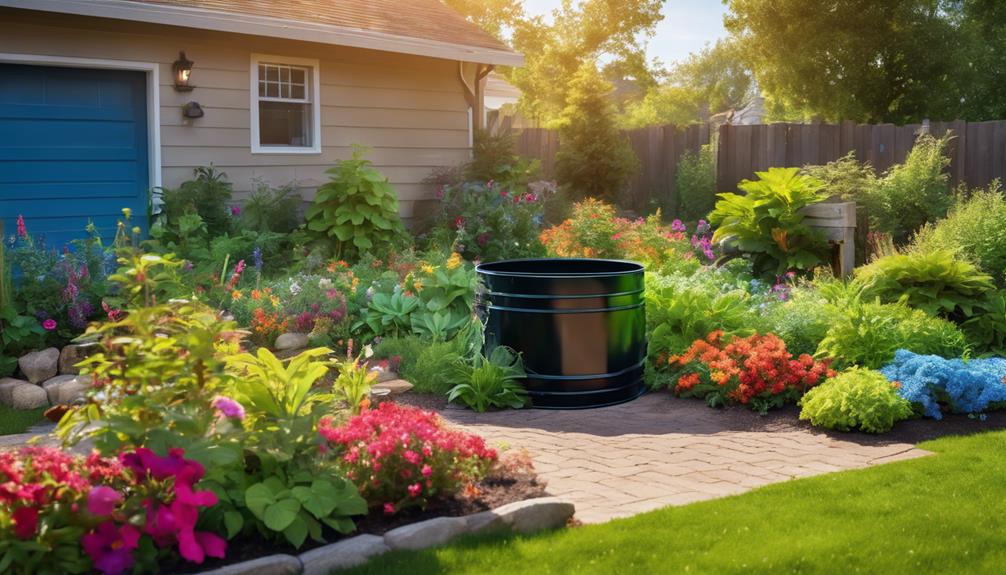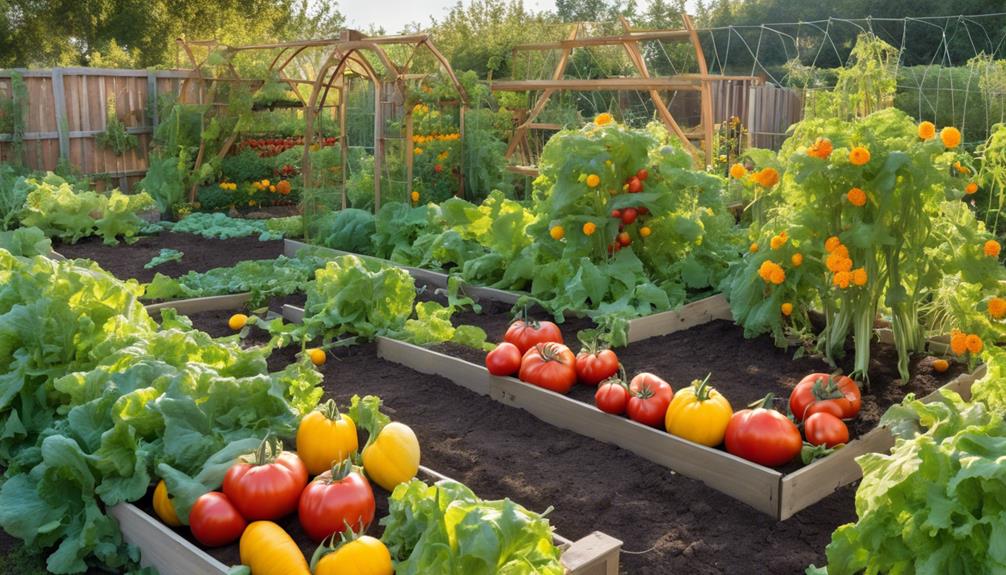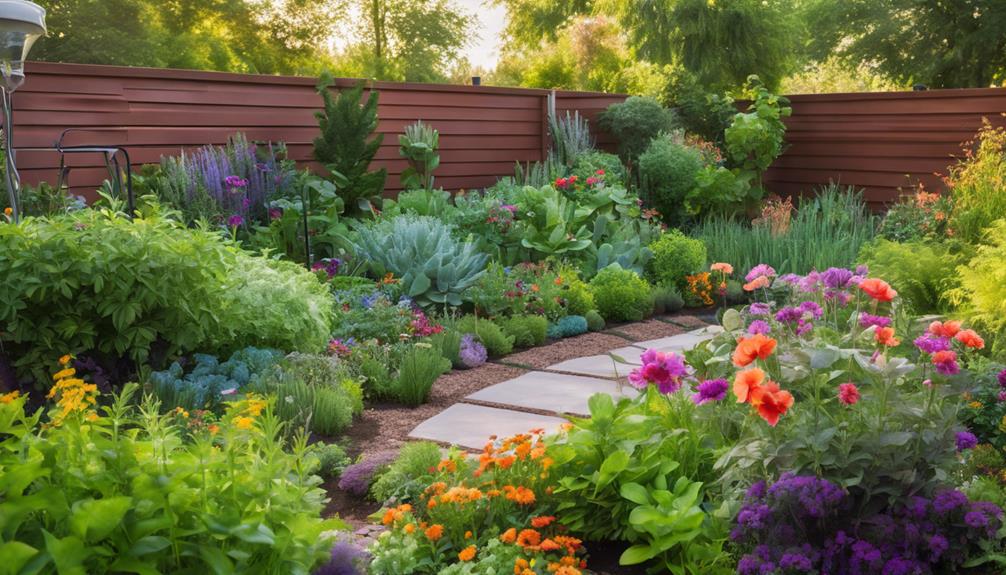
Tips for Urban Garden Seasonal Cleanup
7 February 2025
What Are Your Options for Fencing and Landscaping?
7 February 2025To establish a sustainable garden care routine, begin by selecting native plants that flourish in your local climate. This choice promotes biodiversity and reduces water usage, making maintenance simpler.
Next, incorporate composting to recycle organic waste, enriching your soil while minimising reliance on chemical fertilisers.
Ultimately, implement sustainable pest management techniques, such as introducing beneficial insects and employing natural alternatives to chemical pesticides. These strategies not only foster a healthier garden but also contribute to a thriving ecosystem.
Investigate further to uncover additional practices that can enhance your sustainable gardening efforts.
Sustainable Practices for Gardening
Incorporating sustainable practices in gardening is crucial for fostering a healthy ecosystem.
Selecting native plants enhances biodiversity and reduces the need for excessive watering and fertilisers.
Furthermore, composting not only minimises waste but also enriches soil health, promoting sustainable growth in your garden.
Native Plant Selection
Choosing native plants for your garden can dramatically enhance local biodiversity while reducing the need for chemical fertilisers and pesticides.
Native species are adapted to the local climate, soil, and wildlife, ensuring resilience and minimal maintenance. By selecting plants native to your region, you create a habitat that supports local pollinators, birds, and beneficial insects, fostering a balanced ecosystem.
Furthermore, native plants typically require less water, making them an excellent choice for sustainable gardening.
When curating your selection, consider the specific conditions of your garden, such as sunlight, soil type, and moisture levels. This tailored approach not only boosts the ecological value of your garden but also promotes a sense of place, connecting you more deeply to your local environment.
Composting Benefits
Integrating native plants into your garden provides a strong foundation for sustainable gardening practices, and composting emerges as a powerful tool to further enhance this approach.
Composting not only recycles organic waste but also enriches soil health, enhancing nutrient availability and microbial activity. This process transforms kitchen scraps and garden debris into a rich soil amendment, reducing the need for chemical fertilisers and minimising environmental impact.
Furthermore, composting improves soil structure, promoting better water retention and aeration, which is essential for plant vitality. By incorporating compost into your gardening routine, you foster a closed-loop system that supports biodiversity and resilience.
Ultimately, embracing composting allows gardeners to cultivate thriving ecosystems that align with sustainable practices, contributing to a healthier planet.
Soil Health and Composition
Maintaining healthy soil is essential for sustainable gardening, as it directly influences plant growth and ecosystem balance.
Incorporating organic matter, practising crop rotation, and selecting native plants are effective strategies to improve soil composition and fertility.
Organic Matter Enrichment
Organic matter enrichment serves as a cornerstone for enhancing soil health and composition, providing vital nutrients and improving structure.
By incorporating organic materials into the soil, gardeners can cultivate a thriving ecosystem that supports plant growth and sustainability.
The benefits of organic matter are manifold:
- Nutrient Supply: Organic matter releases fundamental nutrients, facilitating plant uptake and enhancing growth.
- Soil Structure: It improves soil aeration and drainage, promoting root development and resilience against erosion.
- Microbial Activity: Enriched soil fosters beneficial microorganisms, which play an important role in nutrient cycling and organic matter decomposition.
Organic matter enrichment is essential for maintaining a healthy and productive garden environment.
Crop Rotation Benefits
Crop rotation serves as a fundamental practice in sustainable gardening, substantially improving soil health and composition. By systematically alternating different crops in a given area, gardeners can enhance nutrient availability, disrupt pest cycles, and promote microbial diversity. These benefits contribute to a resilient ecosystem and ultimately lead to higher yields.
- Nutrient Management: Different crops extract distinct nutrients from the soil, allowing for a balanced nutrient profile when rotated.
- Pest and Disease Control: Alternating crops reduces the likelihood of pest infestations and soil-borne diseases, decreasing the need for chemical interventions.
- Soil Structure Improvement: Varied root systems from diverse plants enhance soil structure and aeration, promoting better water infiltration and root development.
Implementing crop rotation is crucial for long-term soil health and garden productivity.
Native Plant Selection
Selecting native plants for your garden is an essential strategy for improving soil health and composition. Native plants are adapted to local conditions, promoting biodiversity and minimising the need for chemical fertilisers and pesticides. Their root systems enhance soil structure and boost water infiltration, which is important for sustainable gardening.
Consider the following benefits of incorporating native plants:
- Soil Stabilisation: Their deep roots prevent erosion and strengthen soil integrity.
- Nutrient Cycling: Native plants support a balanced ecosystem, enriching the soil with organic matter.
- Microbial Diversity: They foster beneficial soil microorganisms, significant for nutrient availability and overall soil health.
Garden Planning Essentials
Effective garden planning is essential for achieving a thriving, sustainable garden.
Key considerations include selecting the right location, applying mulch to retain moisture, and implementing companion planting strategies to improve biodiversity.
Choose the Right Location
A gardener's success often hinges on the choice of location for their plants.
Selecting an ideal site is essential for ensuring robust growth and sustainability. Key factors to take into account include:
- Sunlight Exposure: Most plants require a minimum of six hours of direct sunlight each day. Assess your garden's light conditions throughout the day.
- Soil Quality: Conduct a soil test to evaluate pH levels and nutrient content, ensuring that the selected location can support the desired types of plants.
- Drainage and Water Access: Choose a location with proper drainage to prevent waterlogging while also evaluating proximity to water sources for irrigation.
Mulch to Retain Moisture
Applying mulch is one of the simplest and most effective strategies to retain moisture in your garden. By creating a protective layer over the soil, mulch minimises evaporation, ensuring that your plants have consistent access to water.
Furthermore, mulch can suppress weeds that compete for moisture and nutrients.
When selecting mulch, consider these key options:
- Organic Mulch: Materials such as wood chips, straw, and grass clippings enrich the soil as they decompose.
- Inorganic Mulch: Gravels or landscape fabrics provide long-lasting coverage and require less maintenance.
- Thickness: Aim for a mulch layer of 5-10 centimetres to achieve ideal moisture retention without smothering plant roots.
Incorporating mulch into your garden care routine is a crucial practice for sustainable gardening.
Companion Planting Strategies
Building on the importance of creating an ideal environment for your plants, companion planting offers a strategic approach to garden planning.
This technique involves pairing compatible plants to enhance growth, deter pests, and optimise space. By understanding plant relationships, gardeners can cultivate more productive and sustainable ecosystems.
Consider the following companion planting strategies:
- Pest Management: Planting marigolds alongside vegetables can repel nematodes and other harmful insects.
- Nutrient Improvement: Legumes, such as peas and beans, fix nitrogen in the soil, benefiting neighbouring plants like corn and peppers.
- Space Optimisation: Utilise the vertical growth of peas or beans to shade lower-growing crops, maximising garden space.
Implementing these strategies can lead to a thriving, resilient garden ecosystem.
Increased Biodiversity in Gardens
While many gardeners prioritise aesthetics and productivity, enhancing biodiversity in gardens is crucial for fostering resilient ecosystems. A diverse selection of plants attracts various beneficial insects, improves soil health, and promotes natural pest control, thereby cultivating a balanced environment.
| Aspect | Benefits |
|---|---|
| Plant Variety | Enhances resilience to pests and diseases |
| Native Species | Supports local wildlife and pollinators |
| Layered Planting | Provides habitat and sustenance for diverse species |
| Companion Planting | Optimises resource use and minimises competition |
Sustainable Pest Management Techniques
Sustainable pest management techniques are crucial for maintaining a healthy garden ecosystem.
Strategies such as the release of beneficial insects, the use of natural pesticide alternatives, and organic neem oil treatments can effectively control pests while minimising harm to non-target species.
Beneficial Insect Release
Integrating beneficial insects into your garden can greatly enhance pest management while promoting a balanced ecosystem. By introducing these natural allies, you can effectively control pest populations without relying on synthetic chemicals.
Understanding the specific roles these insects play is essential for maximising their benefits.
Consider releasing the following beneficial insects:
- Ladybirds: Effective predators of aphids and other soft-bodied pests.
- Lacewings: Known for their voracious appetite for aphids, thrips, and caterpillars.
- Parasitic Wasps: Target pest larvae and eggs, considerably reducing their populations.
To achieve optimal results, ensure your garden provides suitable habitats, such as flowering plants and shelter, to promote the survival and reproduction of these beneficial insects.
This sustainable approach can lead to healthier plants and a thriving garden ecosystem.
Natural Pesticide Alternatives
Effective pest management in the garden can often be achieved through the use of natural pesticide alternatives.
These eco-friendly options provide a sustainable way to protect your plants without the harsh chemicals that can harm beneficial insects and the environment.
Implementing these strategies can lead to a healthier ecosystem and a more productive garden.
- Diatomaceous Earth: A natural abrasive that targets soft-bodied insects without affecting beneficial ones.
- Garlic Spray: Utilises the natural repellent properties of garlic to deter a variety of pests.
- Soap Solutions: Simple mixtures of water and natural soap can suffocate insects while being safe for plants.
Adopting these methods improves biodiversity and promotes a sustainable gardening practice.
Organic Neem Oil Treatment
While many gardeners seek chemical-free solutions for pest control, organic neem oil stands out as a potent ally in sustainable pest management. Extracted from the seeds of the neem tree, this natural insecticide targets a variety of pests while remaining safe for beneficial insects when used correctly.
To effectively harness the benefits of neem oil, consider the following practices:
- Dilution: Always dilute neem oil with water and a mild soap to enhance its efficacy and prevent leaf scorch.
- Timing: Apply it during the cooler parts of the day to minimise evaporation and optimise absorption.
- Frequency: Regular applications every 7-14 days can disrupt pest life cycles and significantly reduce infestations.
Pest Infestations and Remedies
Effective management of pest infestations is crucial for maintaining a healthy garden ecosystem.
Techniques such as companion planting, strategic crop rotation, and integrated pest management can significantly reduce pest pressures while promoting biodiversity.
Companion Planting for Pest Control
Utilising companion planting techniques can considerably enhance pest control in sustainable gardens. This method involves strategically pairing plants to improve their natural defences and deter pests.
By understanding the relationships between different species, gardeners can cultivate a more resilient ecosystem.
Consider these effective companion planting combinations:
- Marigolds with Tomatoes: Marigolds emit a scent that repels nematodes and other harmful insects.
- Basil with Peppers: Basil not only enhances the flavour of peppers but also acts as a natural deterrent for aphids and spider mites.
- Nasturtiums with Cabbage: Nasturtiums attract aphids away from cabbage, providing a trap crop that protects your main plants.
Implementing these pairings fosters biodiversity, reduces chemical reliance, and promotes a healthier garden environment.
Crop Rotation Timing Strategies
Implementing crop rotation strategies is vital for managing pest infestations and maintaining soil health in sustainable gardening. By rotating crops, gardeners disrupt the life cycles of pests that thrive on specific plants, thereby reducing their populations.
Effective timing is fundamental; consider the following strategies:
- Plant Families: Rotate crops within different plant families to prevent soil-borne diseases and pest recurrence.
- Seasonal Rotation: Align crop rotation with seasonal planting schedules to optimise growth and deter pests.
- Soil Nutrient Management: Alternate deep-rooted and shallow-rooted plants to improve soil structure and nutrient availability, reducing pest vulnerability.
These strategies foster a balanced ecosystem in your garden, promoting resilience against pests while enhancing soil health.
Mastering crop rotation is an essential skill for any sustainable gardener.
Integrated Pest Management Techniques
Managing pest infestations in a sustainable garden requires a comprehensive approach that goes beyond traditional methods. Integrated Pest Management (IPM) emphasises ecological balance and the use of multiple strategies to effectively mitigate pest issues.
This holistic approach not only minimises chemical use but also promotes biodiversity.
Key IPM techniques include:
- Cultural Controls: Implement practices such as crop rotation and intercropping to disrupt pest life cycles.
- Mechanical Controls: Employ physical barriers like row covers and traps to prevent pest access.
- Biological Controls: Introduce beneficial organisms, such as ladybirds or parasitic wasps, to naturally regulate pest populations.
Why Choose TKL Birmingham Gardener
Choosing the right gardening service can significantly impact the health and sustainability of your garden. TKL Birmingham Gardener stands out due to its commitment to eco-friendly practices and sustainable methodologies.
With a team of skilled professionals, TKL employs advanced techniques that minimise chemical use, promoting a healthier ecosystem. Their tailored approach ensures that each garden receives the specific attention it requires, from soil enrichment to pest management.
Furthermore, TKL emphasises ongoing education for both clients and staff, fostering a deeper understanding of sustainable gardening principles.
Gardening Q&A and Insights
Engaging with gardening inquiries can greatly enhance your understanding of sustainable practices and effective garden management. By addressing common questions, gardeners can delve deeper into the intricacies of plant care, soil health, and ecological balance.
For instance, inquiries regarding composting techniques can enlighten gardeners on nutrient recycling, while questions about pest management can lead to the exploration of organic solutions that foster biodiversity.
Additionally, discussing water conservation strategies can heighten awareness of sustainable irrigation methods, which minimise waste and promote plant health.
Utilising forums, workshops, or local gardening clubs facilitates knowledge exchange, helping individuals refine their skills. By embracing a curious mindset and seeking answers, gardeners can cultivate not just their plants but also a thriving, sustainable ecosystem.
Plan for Seasonal Planting
A well-structured plan for seasonal planting is vital for maximising garden productivity and ensuring a diverse array of plants thrive throughout the year.
By strategically timing your planting, you can optimise growth, yield, and ecological balance.
Consider the following fundamental elements when formulating your seasonal planting schedule:
- Crop Rotation: Alternate plant families to improve soil health and reduce pest infestations.
- Companion Planting: Pair plants that benefit each other to enhance nutrient uptake and deter harmful insects.
- Seasonal Adaptation: Select varieties suited to your climate zone, ensuring resilience against seasonal fluctuations.




